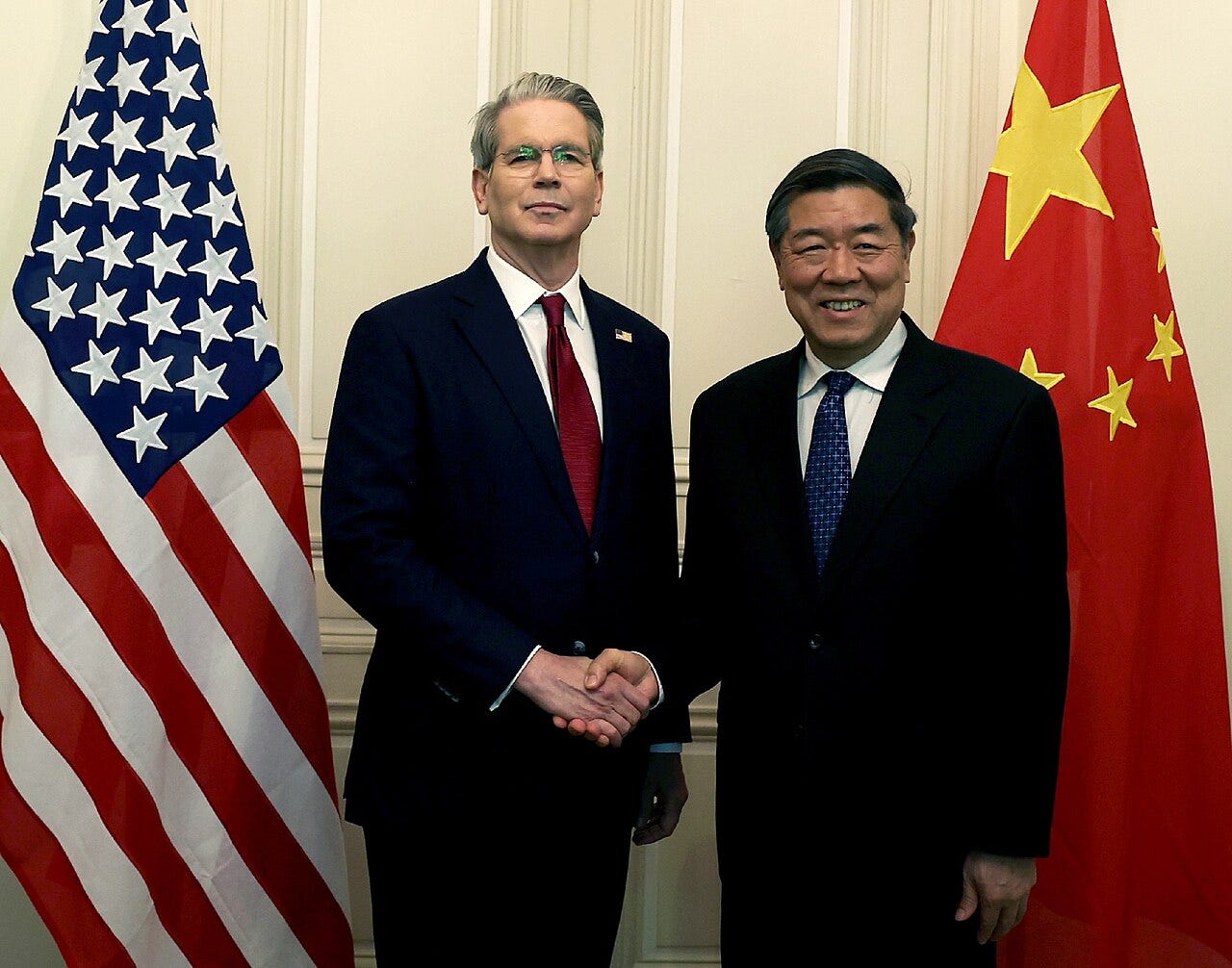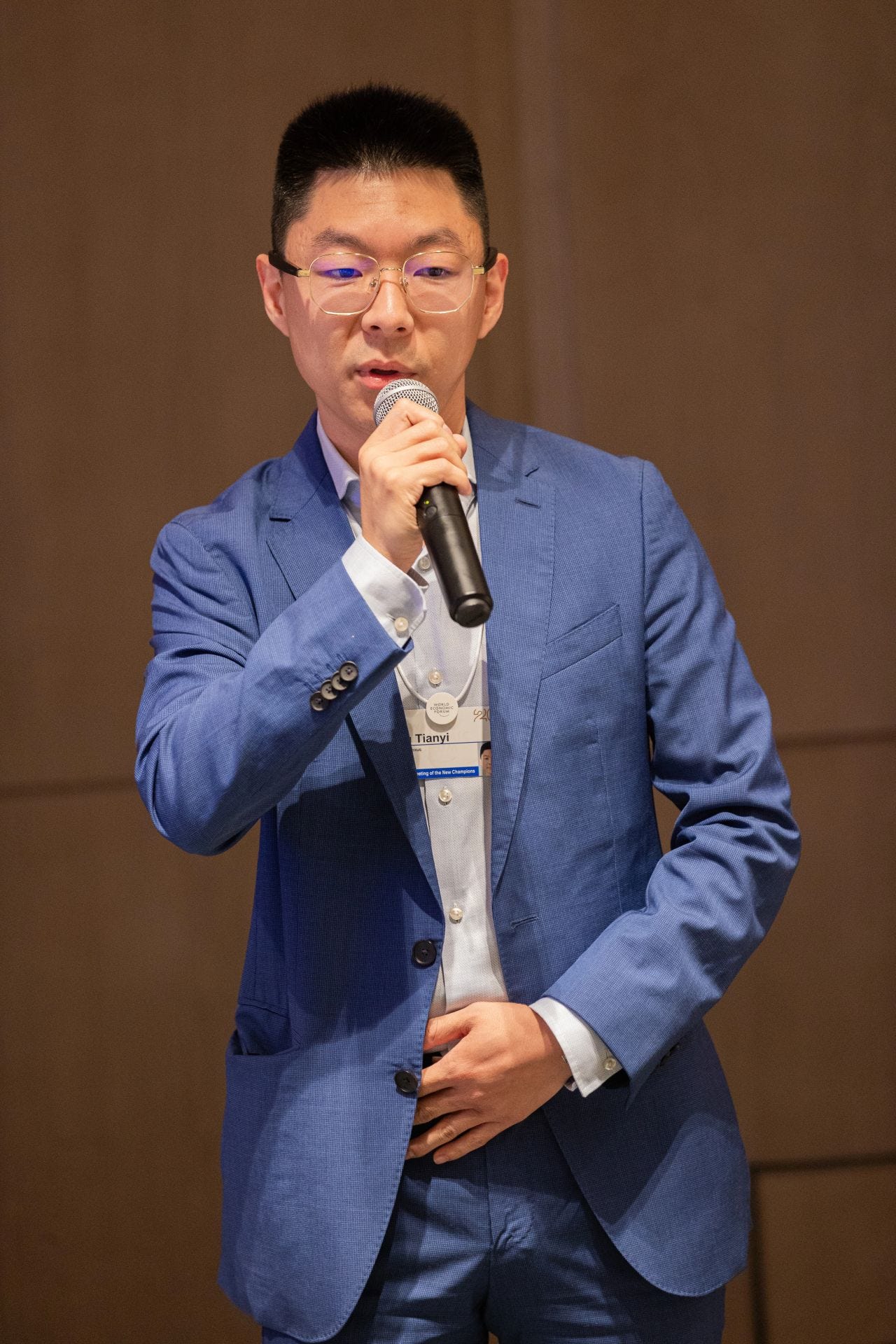The Trade War Forged a New Paradigm w/ Thomas Liu
How will Chinese enterprises navigate global change?

In this interview, we sat down with Liu Tianyi (Thomas Liu), a Chinese company globalization strategist and founder and CEO of the consulting firm Policy Nexus, based in Ottawa, Canada. Liu is also a research fellow at The Institute for Peace & Diplomacy in Canada. We delved into the impact of recent trade negotiations, the crucial role of rare earths, and how ongoing trade competition is reshaping global supply chains.
Juan Zhang: The United States and China have just concluded their second round of trade talks in London. How do you interpret the outcomes of these negotiations?
Thomas Liu (TL): In the second round of U.S.-China trade talks held in London, China emphasized the achievement of a “principled framework” and the rebuilding of mutual trust, while the U.S. highlighted the “productive” nature of the discussions and the implementation of concrete measures, such as rare earth supply, tariffs, and visa policies. Though these approaches may appear divergent, they in fact demonstrate a complementary negotiation logic. China’s proposal of a structural framework provides long-term institutional support for the bilateral relationship, preventing the talks from becoming mere transactional exchanges.
Meanwhile, the U.S.’s focus on operational outcomes helps deliver predictability to domestic markets, allies, and global supply chains. China’s emphasis on trust signals a shift from tactical bargaining to strategic dialogue, a rational correction to the previous cycle of high-frequency friction and zero-sum confrontation. The U.S., on its part, reflects practical concerns over supply chain resilience, tech controls, and academic exchanges.
Together, both sides are sending a clear message: amid rising global uncertainty, dialogue remains preferable to confrontation, and institutional engagement is more sustainable than reactive escalation. This opens a cautious yet realistic path toward stability in U.S.-China relations, while injecting a degree of confidence into the global economic outlook.
JZ: Many reports suggest that China’s export restrictions on rare earth materials were a key factor pushing the United States back to the negotiating table, and may also be behind recent U.S. threats, such as revoking Chinese student visas. How do you view the role of rare earths in the current and future trade negotiations?
TL: Amid intensifying strategic competition between China and the United States, rare earth elements have emerged not only as a focal point of bilateral contention but also as a symbolic “interface for dialogue.” As essential inputs for critical industries such as renewable energy, defense, and semiconductors, the strategic value of rare earths has long transcended the market dimension, becoming a core variable in assessing supply chain security, industrial autonomy, and national security. Precisely because of this structural significance, rare earths have become a crucial topic of engagement between the two powers.
In a climate marked by deepening antagonism and fragile mutual trust, rare earths present a controlled, limited, yet operationally viable entry point for dialogue. During the recent U.S.-China trade talks in London, China’s proposal to establish a “fast track” for non-military rare earth users, coupled with the U.S.'s indication of flexibility in technology export controls, reflects a pragmatic willingness on both sides to explore “mechanized engagement” in sensitive domains. This represents not only a logic of crisis management, but also a concrete attempt to build “limited consensus” — offering a replicable model for communication in other contentious areas.
Thus, rare earths are more than just bargaining chips in U.S.-China competition; they represent a potential paradigm. They demonstrate that even within a framework of strategic rivalry, certain issues with global public goods characteristics retain space for consensus. And even in the absence of comprehensive cooperation, it is possible to manage divergences, rebuild limited trust, and reduce the risk of escalation through institutionalized mechanisms.
Rare earths, in this sense, are both resource and dialogue; both source of friction and potential breakthrough for exploratory coordination. At a time when geoeconomic fragmentation is accelerating and global rules are being rewritten, such a “micro-adjustment mechanism within structural competition” may well prove to be a crucial anchor for stabilizing U.S.-China relations and safeguarding the resilience of global supply chains.

JZ: Some experts argue that the ongoing trade talks are part of a broader strategic competition between the two countries. Since President Trump launched the trade war in 2018, where do you think the U.S.-China trade war currently stands? Has it shifted from tactical negotiation to long-term strategic rivalry?
TL: The U.S.-China trade war, though initially a tactical contest, has gradually evolved into a deeper and more structural strategic competition over time. While this shift has brought challenges and friction, objectively, the trade war has accelerated China’s pace of industrial upgrading and technological innovation, promoting a transition from being the “world’s factory” toward higher value-added manufacturing and independent research and development.
This transformation in fact, helps strengthen China’s economic resilience and global competitiveness. Meanwhile, the United States has used the trade war as an opportunity to reassess supply chain security and control over core technologies. For both sides, it is a painful but necessary process of passive growth. Furthermore, the strategic competition has prompted both countries to engage in more targeted institutional dialogue and exploration in areas such as rule-making, industry standards, and global governance to manage differences and rivalry. Both sides—and the world—must adapt to this new paradigm. So far, the negotiation progress between the two countries has sent positive signals, which undoubtedly benefits both nations and the global community.
JZ: What are the main challenges Chinese companies face when expanding overseas—particularly regarding public perception?
TL: In the process of “going overseas,” Chinese companies face numerous external challenges, but the more fundamental and deeper obstacles often stem from internal management and a lack of knowledge.
Firstly, many Chinese enterprises, especially small and medium-sized ones, lack sufficient experience operating in international markets and have an inadequate understanding of the target markets’ culture, laws, regulations, and social customs. This gap in awareness makes it difficult for them to effectively address local public concerns and suspicions, sometimes leading to misunderstandings and a crisis of trust due to poor communication. Secondly, some companies underinvest in overseas brand building and public relations, failing to systematically shape their image and manage public opinion. They often focus only on short-term economic gains and overlook the importance of public perception and the need for ongoing maintenance.
Additionally, internal management systems have yet to fully adapt to the complexities of international operations, with weaknesses in cross-cultural management, compliance risk control, and corporate social responsibility practices. These internal limitations restrict their ability to respond effectively to external challenges. Overall, for Chinese companies to gain broader recognition and support on the global stage, they must strengthen strategic awareness, improve management capabilities, and proactively increase investment in brand, public relations, and compliance—addressing internal shortcomings fundamentally to better manage external pressures and achieve sustainable international development.
Juan Zhang is a senior writer for the U.S.-China Perception Monitor and managing editor for 中美印象 (The Monitor’s Chinese language publication).
The views expressed in this article represent those of the author(s) and not those of The Carter Center.
Peace is always on the back foot. To promote peaceful cooperation between the United States and China, all content from the Monitor is provided here for free. If you would like to contribute to our work, please feel free to make a donation to The Carter Center. Please indicate your donation is for China Focus.
That’s all from Atlanta. Y’all be good.





